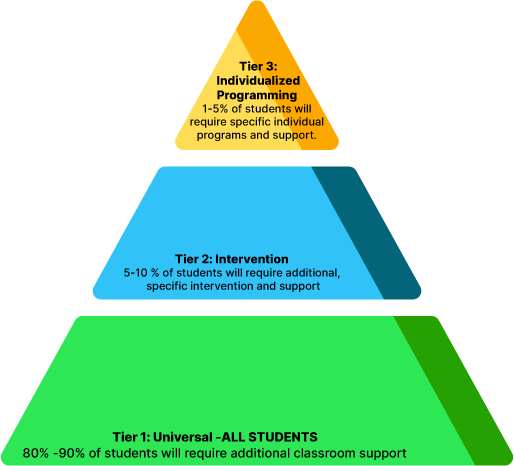Support Services
Support Services at WAB
At WAB, we believe students learn best in a caring and inclusive environment. WAB’s Support Services model provides focused and targeted instruction to meet diverse student needs. We use a collaborative approach to co-plan, co-teach, and co-assess so that students can learn in an inclusive environment with high expectations and high support.
The school’s philosophy is to help students reach their full potential as individuals in the global community. This collaborative approach allows all students to receive support, regardless of individual needs.
This service also aims to differentiate for students who demonstrate a specific need. The Support Services specialist confers with the homeroom teacher to discuss goals and content material to meet the individual learner’s needs. Our goal is to offer transparency in our programs to all stakeholders as appropriate. We look at each individual child’s needs at time of admission with a view of support.
A Model of Instruction at WAB
Students receive support in the classroom from the homeroom teacher, the support services teachers, and teaching assistants. The staff members work together with students to assess, plan, and teach students. Each classroom and grade level uses a flexible menu of approaches, such as co-teaching models, in-class accommodations and strategies, and/or small groups to support the learning needs of students.
In addition, two counselors, an educational psychologist, and a social-emotional learning coach liaise across the Early Childhood Center and the Elementary School. These personnel meet regularly with homeroom teachers and Support Service teachers to address the needs of specific students.
Effective Classroom Instruction with Differentiated Instructional Strategies: All students receive instruction in a differentiated classroom by the homeroom/single-subject teacher, in collaboration with the support team, as appropriate. Co-teaching models are implemented for this instruction as required.
Strategic and Targeted Instruction: Students with specific need have a plan that includes necessary accommodations and targeted strategies provided by the support team. These students are on the support register.
Individualized Instruction: This instruction involves detailed plans. These students receive some one-to-one support and extensive accommodations are in place. This includes long-term goals and ongoing partnership between the school and home. WAB continually assesses how or if we can meet the needs of the students in this category.
Our Support Services Model Includes: Counseling, English as an Additional Language (EAL), Learning Support, in class Enrichment, Educational Psychologist, Nursing, and a range of external providers. Students, parents, and staff are involved in a collaborative process for developing differentiated programs that best support the learning needs of the child as a whole in an inclusive class environment. We offer pull-out support: Individualized Literacy Support (ILS), Emergent English (EE), and individualized support. We also offer individualized support on a case-by-case basis. We track our students and have set procedures for documentation.
Model of Instruction at WAB

Student Support Model

Support Services Referral Process
When there is a concern about a student’s learning a teacher or parent may ask for assistance. This concern may be about specific academic, social, emotional, or behavioral issues. The homeroom teacher and the student’s grade-level learning team develop a student support plan for that child and share it to get input from the parents.
The identification of students’ learning needs is a collaborative process that is achieved through analysis of a variety of objective and subjective assessment data. Objective assessments include group and individual tests of ability, standardized tests of achievement, curriculum assessments from WAB, and previous schools results. Subjective assessments may include observations, checklists (parent, teacher, and student), student work samples, and interviews.
Specific Responsibilities and roles of Support Services
Learning Support
WAB’s Learning Support (LS) teachers support students with additional learning needs through collaboration, co-teaching, and pull-out lessons. The LS teachers collaborate with classroom teachers to differentiate their programs and to ensure that accommodations and modifications that may be required by the LS student are implemented. Sometimes they will be required to assist with referrals to community professionals and collaborate with teachers to follow recommendations.
LS teachers, when appropriate, will work with specialists to provide opportunities for students to receive therapy and specialized programs from professionals in the community. The LS teachers will also plan and implement Individual Education Plans (IEP) for high-needs students.
English as an Additional Language (EAL)
WAB’s EAL teachers support EAL students as well as assist classroom teachers with the differentiation of their programs. EAL programs are designed to help EAL students who may need extra support with various learning in the homeroom or individual subjects. The EAL specialist and involved teachers confer regularly to discuss students’ needs and develop strategies based on those needs and expectations.
Enrichment
WAB believes that while all our students have strengths that must be valued and promoted, there are students whose educational needs are different from their peers due to the nature of their academic strengths. Enrichment support within the school promotes student progress in all elements of the IB and WAB programs and utilizes a range of individualization options, grouping, and regrouping practices for a variety of learning situations in order to facilitate appropriate provision.
Counseling
Counselors support the academic, social, and emotional needs of students. Counselors offer support services for students and families as they manage issues of studying and living in an international environment. Counselors endeavor to promote personal well-being, healthy relationships, and the successful balance of academic, extracurricular, and community involvement for WAB students.
Behavioral Support
Students needing behavior support will receive it through a collaborative team approach, which may include administration, a grade level leader, homeroom teacher, support services staff, and his/her counselors.
Nursing
WAB nurses form an important part of our support team. Nurses focus on the health and well-being of families and students. They collaborate with other school services as appropriate. WAB employs a full-time Chinese registered nurse, as well as foreign-hire registered nurses.
Homeroom Teacher
The homeroom teacher is an integral part of support for students. They work in collaboration with other services as needs arise.
Individual Education Plans (IEP)
This is a school-wide term used for individual plans for students who need one-to-one support and extensive accommodations. This plan includes long-term goals and ongoing partnership between school and home. Students may have had internal and external evaluations.
These plans are written and reviewed collaboratively with relevant teaching personnel and parents. When the school receives an external evaluation such as an occupational therapy, language, or psycho-educational evaluation, an IEP will be written. When WAB accepts a student with an updated IEP, WAB endeavors to follow the recommendations sited in the plan.
Individualized Literacy Support (ILS)
ILS is an academic intervention program for students who have specific, identified learning needs. This program occurs during the additional Languages block. Students in this program have an IEP. Their progress is closely monitored, and their plans are reviewed and updated twice a year. Access to this program has strict criteria. Student enrollment in this program alters from year to year.
Emergent English (EE) and Bridging English (BE) Programs
The Emergent English Program is designed to give intensive English language support for those new to English acquisition. Students involved in this program will attend classes during, and in place of, the additional Languages block. The Bridging English Program is designed to give additional language support to those still consolidating English language skills.
